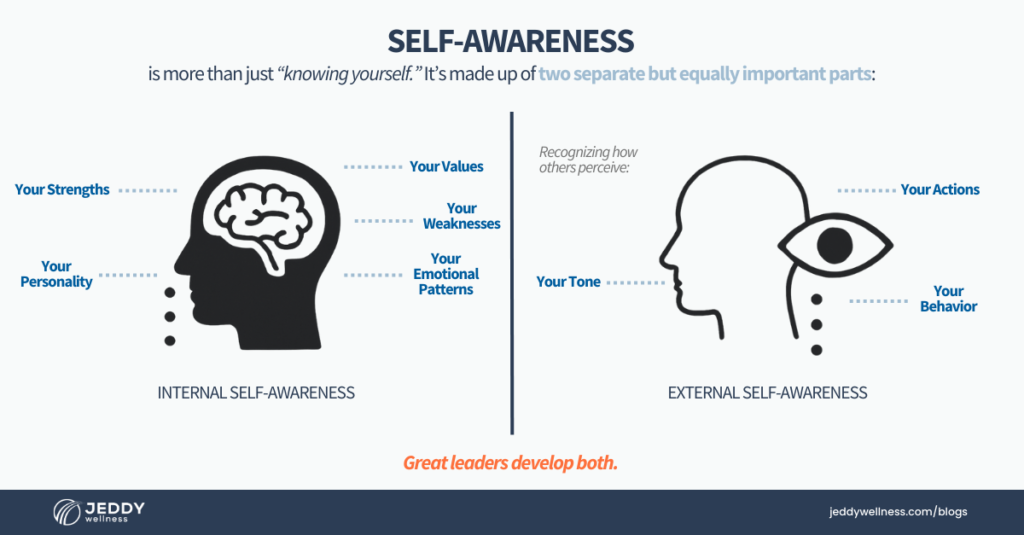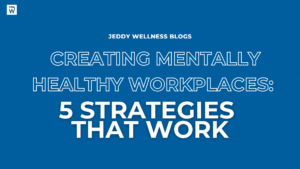“Working on your self-awareness will put you ahead of 80% of your colleagues. It is the secret ingredient.”
Dr. Tasha Eurich, author of Insight
At Jeddy Wellness, we believe the most powerful form of leadership starts from within. According to organizational psychologist and bestselling author Dr. Tasha Eurich, that power lies in one core skill…
Self-awareness
In her book Insight: The Surprising Truth About How Others See Us, How We See Ourselves, and Why the Answers Matter More Than We Think, Dr. Eurich explains how developing self-awareness helps leaders make smarter decisions, build stronger relationships, and lead with confidence, clarity, and purpose.
Below, we break down her most powerful insights and how to apply them in your life and leadership.
Misalignment in any of these areas can also contribute to burnout. Understanding them helps you create effective solutions. The Areas of WorkLife Survey offers deeper insights into these areas.
What Is Self-Awareness, Really?
Self-awareness is more than just “knowing yourself.” It’s made up of two separate but equally important parts:
- Internal Self-Awareness: Understanding your values, strengths, weaknesses, personality, and emotional patterns.
- External Self-Awareness: Recognizing how others perceive your actions, tone, and behavior.
You can be high in one and low in the other.
Great leaders develop both.

Today, self-aware leaders are better equipped to navigate complexity, adapt to diverse teams, and foster trust. By understanding both how they operate internally and how they are perceived externally, leaders can communicate more effectively, make values-based decisions, and create psychologically safe environments where others thrive.
1. Values: What Really Drives You?
Leadership without clarity is like driving in fog. You can move, but you won’t know if you’re heading in the right direction.
Dr. Eurich encourages leaders to define their top core values. Not the ones that sound impressive, but the ones that feel like home.
Examples: Health, Curiosity, Service, Growth, Love Adventure
Ask yourself:
“Did my actions at work this week support well-being—both mine and my team’s—in a way that aligns with my core values?”
If not, realign. It’s not about perfection—it’s about integrity. That’s radical accountability and timeless leadership.
This idea of living in alignment with your values connects closely with the DRAMMA model of well-being: Detachment, Relaxation, Autonomy, Mastery, Meaning, and Affiliation (which we have discussed in many of our blogs). In particular, “meaning”, the feeling that your actions contribute to something bigger than yourself. This is essential for workplace wellness and personal fulfillment. When your daily behavior aligns with your core values, you’re not just checking off tasks, you’re living with intention, and that creates sustainable energy, purpose, and impact.
Key Learning: “M” Meaning from the DRAMMA rest and recovery framework
Want help identifying your core values before you start tracking them? It takes just a few minutes and can provide powerful clarity for your leadership journey.
2. Reflection vs. Rumination: Ask ‘What,’ Not ‘Why’
One of Dr. Eurich’s most surprising findings?
People who over-reflect, especially those who ask “why”, often become less self-aware, more anxious, and less fulfilled.
That’s because “why” questions often trap us in rumination. We start overanalyzing, blaming, or doubting ourselves.
Instead, Eurich recommends asking “what” questions:
❌ Why am I so stressed after this meeting?
✅ What dynamics or unmet expectations in that meeting caused me stress?
❌ Why do I feel burned out at work?
✅ What workplace habits or boundaries might I need to adjust to protect my energy?
❌ Why did that conversation with my team member go badly?
✅ What communication patterns or tone might I shift to create more clarity and trust next time?
❌ Why can’t I focus today?
✅ What part of my environment or workflow is making it hard to stay engaged?
Key message: “Why” leads to paralysis. “What” leads to progress .This one shift can transform how you process challenges and move forward—especially as a leader.
3. Feedback: Your Most Underrated Superpower
Self-aware leaders don’t rely on assumptions, they ask for clear, honest feedback. But they don’t ask just anyone.
Dr. Eurich introduces the idea of “loving critics”, trusted people who:
- Genuinely care about your growth
- Know you well
- Aren’t afraid to be honest
Start by asking:
- “What’s one thing I do that supports the team?”
- “What’s one thing I could do better?”
Then listen. Reflect. Apply. And most importantly, keep asking.
Key message: Feedback should be a habit, not a once-a-year event.
The Cult of Self (And How to Avoid It)
Social media has made it easy to fall into what Eurich calls the “Cult of Self.”
We filter our lives, present perfection, and mask vulnerability. In doing so, we become disconnected from who we really are.
Great leaders aren’t performers—they’re informers.
They focus on adding value, not seeking validation.
The most trusted, inspiring leaders are the ones who show up with humility, curiosity, and a willingness to grow.
Final Takeaway: Self-Awareness Is the Edge Most Leaders Are Missing
Whether you’re leading a team, a household, or just yourself—everything gets better when you get clear on who you are and how you’re showing up in the world.
👉 Define and reflect on your core values. Take the values test.
👉 Shift from “why” questions to “what” questions.
👉 Seek feedback from trusted, loving critics.
👉 Live and lead from alignment, not appearance
Written By: Jason Roeder and Sumana Jeddy
______________________________
Stay Connected with Jeddy Wellness
Discover evidence-based research and innovative strategies to build and activate healthier workplaces.

Creating Mentally Healthy Workplaces: Five Strategies That Work
And just like that, grocery and drugstore shelves are filled with heart-shaped chocolates. Love is in the air. Christmas trees are long gone. Lights are


